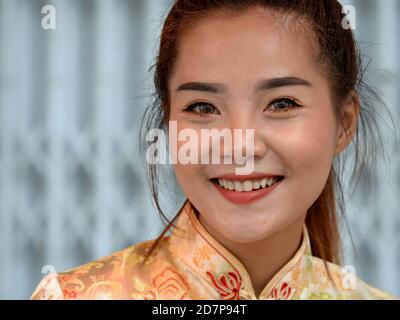The Timeless Allure of Traditional Chinese Cheongsam
The traditional Chinese cheongsam, a symbol of elegance and sophistication, has captivated the world for centuries. Its allure lies in the perfect blend of cultural heritage and modern aesthetics. As we delve into the intricacies of this iconic garment, we uncover its timeless charm and the stories it tells.

A Garment Steeped in History
The traditional Chinese cheongsam, also known as the qipao, has a rich history that dates back to the Qing dynasty. It was originally a loose-fitting garment worn by the Manchu people in the north. Over time, the cheongsam evolved, becoming more form-fitting and eventually a symbol of Chinese femininity. The evolution of the cheongsam reflects the changing social norms and the influence of Western fashion.

Cultural Significance and Symbolism
The traditional Chinese cheongsam is more than just a piece of clothing; it is a canvas that paints the cultural identity of China. The intricate embroidery, the choice of colors, and the patterns all carry deep meanings and are often associated with good fortune, prosperity, and celebration. The cheongsam is especially popular during festive occasions such as Chinese New Year, where it is a common sight to see women adorned in these beautiful garments.

The Art of Craftsmanship
The making of a traditional Chinese cheongsam is an art form in itself. It requires exceptional skill and precision, from the cutting of the fabric to the sewing and the embroidery. The cheongsam is often tailored to fit the individual’s body perfectly, emphasizing the wearer’s curves and elegance. The art of crafting a cheongsam has been passed down through generations, preserving the legacy of this exquisite garment.

Modern Interpretations and Global Appeal
As the world becomes more interconnected, the traditional Chinese cheongsam has transcended its cultural boundaries and gained global recognition. Modern designers have reimagined the cheongsam, incorporating contemporary elements while respecting its traditional roots. This has led to a surge in popularity, with the cheongsam being worn on red carpets, at weddings, and as a fashion statement by celebrities and fashion enthusiasts alike.

Conclusion
The traditional Chinese cheongsam stands as a testament to the enduring beauty of cultural heritage. Its ability to adapt and evolve while maintaining its essence is what makes it a timeless classic. As we continue to embrace and appreciate the cheongsam, we are not just celebrating a garment but also the rich tapestry of Chinese culture that it represents.






